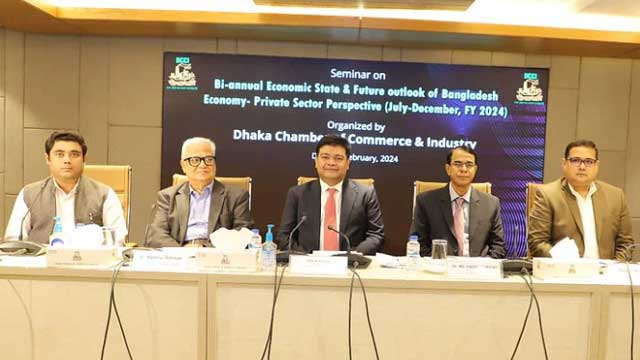Businesspeople and economists said on Sunday that extortion, non-performing loans, the gas crisis, and dollar shortages were holding back the country’s private sector growth.
They also urged the government for sustainable policy reforms and a long-term roadmap for achieving the country’s target of a trillion-dollar economy.
The Dhaka Chamber of Commerce and Industry organised the seminar on ‘Bi-annual economic state and future outlook of Bangladesh’s economy: private sector perspective’ at its auditorium in the capital.
DCCI former president Shams Mahmud, also Shasha Denims Limited managing director, said that the government had to ensure energy at an affordable price and uninterrupted gas supply to the industries to boost private sector investment in the country.
‘After LDC graduation, we must look into establishing import substitute industries to be self-sufficient,’ he said, proposing a rationalised taxation system and continued special support for cottage, micro, small, and medium enterprises.
He said that the dollar crisis had created an adverse impact on the country’s private sector for doing business.
Policy Research Institute senior economist Ashikur Rahman said that macroeconomic instability was not good for the private sector.
‘NPL always has a negative impact on businesses. So it is time to take a serious decision against NPL,’ he said, adding that the country’s tax-to-GDP ratio, which is hovering around 10 per cent, is not up to the expected level.
He also said that the government should take the initiative to check the decline of the country’s foreign currency reserve and ensure that inflation comes down.
Bangladesh Institute of Development Studies research director Mohammad Yunus said that sometimes extortion at the retail market becomes one of the main reasons behind rising inflation.
He asked why the business had to pay extra money to do business in the market.
DCCI president Ashraf Ahmed requested that the government lower corporate tax, complete the automation of the taxation system, increase the tax net, and reform supplementary duty and value-added tax to promote private sector growth.
‘As NPL has an impact on increasing some intermediary costs for the private sector, I suggest reducing NPL. Reducing the cost of doing business, uninterrupted energy supply at an affordable price, and logistic sector development will help the private sector re-investments,’ he added.
He also urged the government to reduce the cost of doing business, ease doing business, improve regulatory efficiency, install appropriate infrastructure, ensure energy security, improve logistics, and ensure access to finance for the private sector for the long-term growth target of achieving a trillion-dollar smart economy.
He noted that the private sector investment target was 27.4 per cent of GDP in FY2024, while it was 21.8 per cent in FY2023.
‘Required policies considering the LDC graduation will expedite private sector investment,’ the DCCI president added.
Speaking as chief guest, the economic affairs adviser to the prime minister, Mashiur Rahman, said that the country’s economy had experienced fundamental changes during the past decade, and the private sector had also flourished remarkably.
‘Policies should be formed considering the problems and prospects of the private sector,’ he added.
He stressed export diversification and value addition to export products and acknowledged that reforms were needed in the taxation system as there are still some problems and challenges.
‘We should also tap into the huge potential of the blue economy,’ Mashiur added.
Bangladesh Bank chief economist Md Habibur Rahman said that due to global geopolitical instability, the price of essentials had increased, and the central bank had already taken the necessary measures to tackle the situation.
‘Bangladesh Bank will introduce a Clawing Peg system to keep the exchange rate under control. The central bank has underscored a roadmap to bring NPL in the industrial sector down to 8 per cent within the next 2 years,’ he said.
He also said that the Bangladesh Bank would maintain contractionary monetary policy until inflation came down to 6 per cent.





